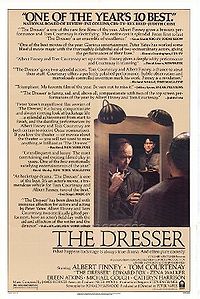The Dresser
Posted by J on December 9, 2008
The Dresser is about a dynamic master/servant relationship, much like the relationship between the Fool and King  Lear in Shakespeare’s famous play. In Lear, the relationship is reversed. The Fool is the wise man, and Lear, the powerful ruler and king, becomes a senile fool. So it is in this movie, and it is fitting that the backdrop of this story is a stage production of Lear.
Lear in Shakespeare’s famous play. In Lear, the relationship is reversed. The Fool is the wise man, and Lear, the powerful ruler and king, becomes a senile fool. So it is in this movie, and it is fitting that the backdrop of this story is a stage production of Lear.
The impossible task for the servant, Norman the “dresser,” is that his friend and employer, a great actor who we only know by “Sir,” has had a senile episode. “Sir” is supposed to play King Lear that evening, but his ravings combined with his egomania make this seemingly impossible. Yet the effeminate Norman perseveres, enduring the selfishness of his employer. What’s in it for Norman? This is one of the central questions of the movie, and it is not certain that we ever fully find out, though there are several possibilities.
Perhaps the reason is simply what “Sir” calls “struggle and survival.” That, Norman reminds him, sums up life. The two are engaged in a production of King Lear during WWII-era Britain. German rockets land perilously close to the theater. Lear was the most popular Shakespeare play of the twentieth century, perhaps primarily for its powerful grimness.
The movie focuses on the backstage preparations, and then production, of this version of Lear. “Sir” has acted in the play 227 times, but he has never been less prepared or more prepared to play Lear. Less prepared, because his mania overwhelms him. More prepared, because he is senile and manic. Off-stage, Norman prods “Sir” to apply his makeup, to put on his frocks, to remember the lines. Norman is as much a moral supporter as he is a personal assistant. The other actors, fearing or disdaining “Sir,” couldn’t possibly understand Norman’s drive to get “Sir” onstage. The show should be cancelled, but Norman persists.
What transpires during and after the production of Lear is for you to find out, but we recommend being familiar with King Lear before watching this movie. It is an acting tour de force, centering on long scenes with the two men, Norman and “Sir.” You must beware: this movie is extremely rich, but it is also exhausting. It feels like a Wagnerian opera, invoking so many emotions over a short span that it feels longer than it is. It is very funny, but as a tragicomedy, it has what might be called a grim worldview. Yet the final emotion offered here, like the one Lear invokes, is perfectly reasonable, as long as it is not meant to be overwhelming.
Yes, the movie is rich. It goes deep into the following topics: senility, servanthood, egomania, male-male bonding, aging, death, romantic longing, and acting versus being. A far from exhaustive list. Watch “Sir” apply his makeup for the part of Lear, and you watch a man age quickly. He knows it.
Entertainment: 9
Intelligence: 10
Morality: see above
Leave a comment